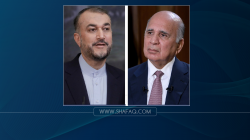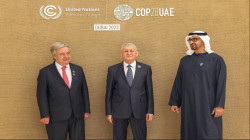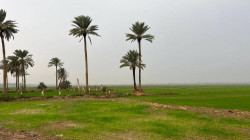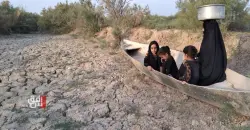Facing the heat: climate challenges and worker safety in Iraq
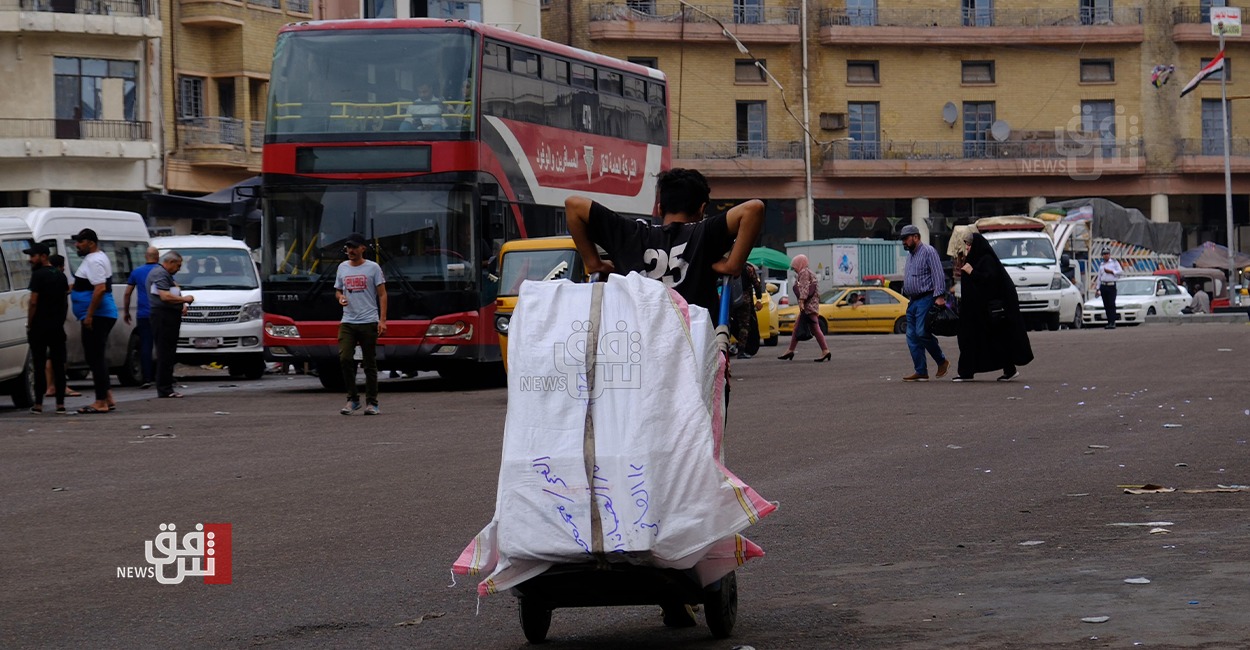
Shafaq News/ In Iraq, workers contend with mounting environmental challenges that pose risks to their health and safety. Increasing temperatures, water scarcity, and frequent dust storms collectively contribute to a challenging work environment for Iraqi laborers.
According to a report released on Saturday by the Iraqi Observatory for Human Rights (IOHR), workers in Iraq, particularly those exposed to direct sunlight, confront significant risks, including heat strokes that can incapacitate them or, in severe cases, lead to fatalities. The impact of climate change manifests in record-high summer temperatures exceeding 50 degrees Celsius in certain Iraqi regions.
Extreme Heat, Low Wages
IOHR said that delivery drivers in Iraq face heightened risks due to their exposure to direct sunlight and extreme heat for much of the year. Among these workers, those who operate during daytime hours are particularly vulnerable.
Nineteen-year-old Mujtaba Hussein, a delivery driver, expressed concerns about stagnant wages irrespective of working conditions: "There are no wage increases whether it's morning or evening, summer or winter. Restaurant owners do not compensate for working in high temperatures."
Twenty-seven-year-old gas seller Aqeel Tarsh highlighted the health toll, having contracted typhoid fever multiple times due to sun exposure. Yet, he persists due to his reliance on the job for his livelihood.
Baraa Mohammed, who works in air conditioning maintenance, lamented the absence of compensation despite facing intense summer heat, "We work under sunlight without any additional pay, despite the associated health risks."
Mohammed Jawad, a porter in commercial markets, faces both low wages and health challenges due to heat exposure, with his sick leave days often going unpaid.
Hussein Mohammed, employed in aluminum, glass, and ironwork, emphasized the unchanging daily wages throughout the seasons, which compelled him to endure the hazards without alternative employment prospects.
Unhealthy and Inhumane Working Conditions
On June 27, 2024, the Ministry of Labor and Social Affairs reported an increase in cases of heat stress among workers this summer, attributing it to "unhealthy and inhumane" working conditions exacerbated by record-high temperatures in Iraq.
Ministry spokesperson Najm Al-Aqabi stated in a press release, "We have documented numerous instances of worker injuries and hospitalizations resulting from extreme heat exposure."
The Observatory's report highlights the severe risks faced by Iraqi workers due to climate change, including exceptionally high temperatures that significantly increase the likelihood of heat strokes and dehydration. Moreover, water scarcity exacerbates challenges in maintaining personal hygiene and health, contributing to a higher risk of disease transmission. These harsh conditions compel workers to operate in unhealthy and hazardous environments, intensifying public health concerns and diminishing productivity.
The Iraqi Observatory for Human Rights revealed that many workers continue to endure these conditions due to the scarcity of alternative job opportunities.
Despite official closures announced by the Iraqi government due to high temperatures, these holidays do not extend to private sector workers. Workers who opt to request leave due to extreme temperatures may face risks associated with leaving their jobs.
Urgent Calls for Safe Conditions
The World Health Organization emphasizes the necessity for workplaces to be equipped with air conditioning and protective measures against harsh weather conditions to ensure the safety and health of workers.
According to the Earth Protection Program (EPP) led by the Observatory, adherence to international standards is essential to mitigate the impact of climate change on workers.
The EPP team asserts that the Iraqi government holds a significant responsibility to safeguard workers from the effects of climate change by enacting stringent laws that force employers to provide safe and healthy working environments.
Furthermore, the International Labour Organization (ILO) stresses the importance of ensuring safe and healthy working conditions, which include regular breaks in shaded or cool areas, provision of clean drinking water, provision of protective clothing and equipment against sunlight, and access to medical services and first aid.
ILO mandates employers and governments to implement measures aimed at reducing workers' exposure to harmful environmental factors. These measures include installing air-conditioning systems in workplaces exposed to high temperatures, providing access to clean water and adequate sanitation facilities, and training workers on coping strategies and protective measures in extreme environmental conditions.
In August 2022, the International Labour Organization in Iraq urged the government, employers' organizations, and workers' organizations to implement appropriate measures to mitigate risks associated with working in extreme temperatures, particularly as temperatures in Iraq have risen to 50 degrees Celsius in recent weeks.
Notably, Iraq has ratified several International Labour Organization conventions aimed at ensuring workers' protection across various sectors, including the Safety and Health in Agriculture Convention, 2001 (No. 184), which underscores the commitment to providing decent working conditions in line with international standards.
Under Iraqi Labour Law No. 37 of 2016, workers are entitled to safe and healthy working conditions, including the provision of personal protective equipment, adherence to legal limits on working hours, and regular rest periods. Workers also have the right to additional compensation for working in hazardous or strenuous conditions.
Fundamental rights that workers are entitled to under both international and local standards include the right to a safe and healthy working environment, adequate rest periods, access to clean drinking water, and fair wages commensurate with the risks associated with their work.
The Observatory stresses Iraq's commitment to International Labour Organization standards and calls for enhanced legislation to regulate workplace safety and ensure effective monitoring and enforcement.
